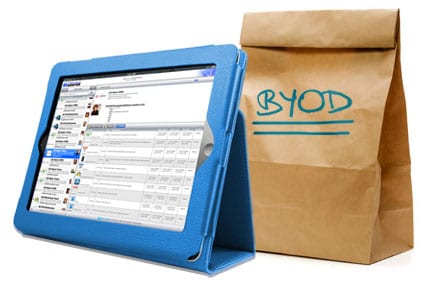BYOD is a big trend in many industries, but as David Krebs, VDC’s VP of mobile and wireless explains, “[BYOD] has limited impact today in areas like field service.” We spoke to Krebs about that issue as well as mobility trends in the industry.
Why have so many field service firms said no to BYOD?
There is opportunity for further development with BYOD, but I have some reservations. Much depends on how companies are approaching their mobile workforce strategy. Is it BYOD or nothing? Is it relying on company-supported devices for technicians or nothing at all?
What are the big drawbacks to BYOD in the field?
 For businesses it’s expensive to develop mobile applications that can properly function across a multitude of platforms. When it comes to field service technology, many of the solutions are sophisticated and require a certain amount of reliability – which is exceptionally difficult to guarantee with varying mobile operating systems and devices.
For businesses it’s expensive to develop mobile applications that can properly function across a multitude of platforms. When it comes to field service technology, many of the solutions are sophisticated and require a certain amount of reliability – which is exceptionally difficult to guarantee with varying mobile operating systems and devices.
Finding a solution comes down to what the context of the application is and how advanced it might be. With features like payment, dispatching, GPS, mapping content, data capture, RFID tag scanners, and receipt printing, how are businesses going to get an application that operates effectively across device to device without developing a native app for each version?
In what context would BYOD work for field service?
Many field service technicians already have their own mobile device. In the case of basic mobile applications such as email and calendar – BYOD is a possible solution. BYOD might be a viable option for smaller businesses and technicians that operate locally, providing that they have access to basic service capabilities.


Great article, Megan.
From my experience, small businesses are making the first steps towards utilizing the mobile field workforce management. When technicians use their personal devices a small business can easily integrate the new workflow without large initial expense. Usually free 30 trials are available to try the mobile workforce management service and businesses have nothing to loose.
Technicians are also willing to try the new technologies. Throughout all the presentations that I’ve done, everyone was very eager to try new apps and see how the work orders look on their phones. It helps technicians as well, as they do not loose paperwork and can get their notes in faster. It’s a win-win situation.
As businesses grow larger and see more potential in mobility – a need for more sophisticated devices emerge and now company owners are more willing to invest in technology.
– Gie Reklaitis, ServiceBridge.com
Good comment on the BYOD post that just went up.
Jeremy – is ServiceBridge a competitor?
Hi Gie — are there any field service companies you can think of that have really nailed the mobility challenge top to bottom?
Mobile access to job and customer information with ability to update the information and the office in a real-time definitely changes how businesses operate. And I do not look at it as a challenge. It is more of an opportunity to start fresh, see what improvements can be made, and build up step by step.
While working with companies from various service industries I learned that the first steps, such as buying mobile devices, training technicians to use mobile apps, and changing how the office staff operates may be time and money consuming, the payout is always greater then anticipated when you see how much more efficient the business operates in a short time span.
After businesses adapt to the new and efficient workflow, they realize that many more steps can be improved as well. If the functionality is not available at the moment, by defining their needs and explaining what are the expected results, they help to make the apps better in a near future.
I think that mobility creates exiting challenges that enable businesses to grow faster, therefore business owners take the advantage, apply new concepts daily, and brainstorm how to do it even better.